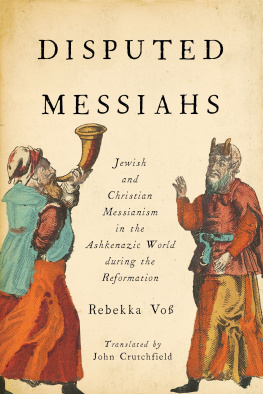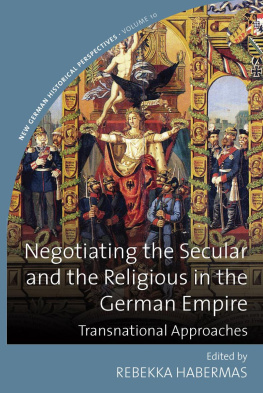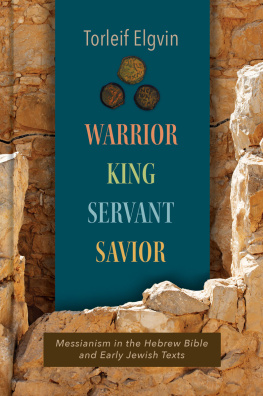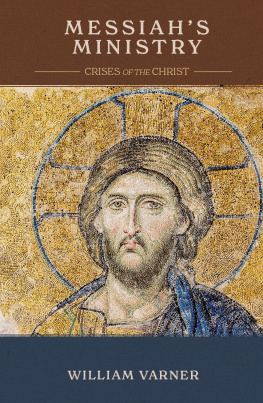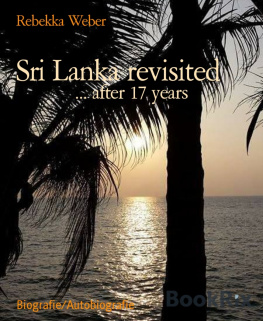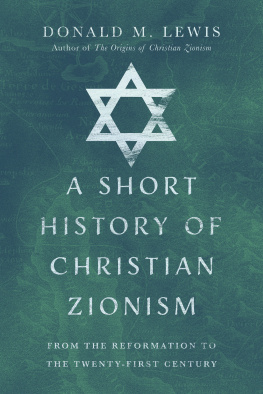Rebekka Voß - Disputed Messiahs: Jewish and Christian Messianism in the Ashkenazic World during the Reformation
Here you can read online Rebekka Voß - Disputed Messiahs: Jewish and Christian Messianism in the Ashkenazic World during the Reformation full text of the book (entire story) in english for free. Download pdf and epub, get meaning, cover and reviews about this ebook. year: 2021, publisher: Wayne State University Press, genre: Religion. Description of the work, (preface) as well as reviews are available. Best literature library LitArk.com created for fans of good reading and offers a wide selection of genres:
Romance novel
Science fiction
Adventure
Detective
Science
History
Home and family
Prose
Art
Politics
Computer
Non-fiction
Religion
Business
Children
Humor
Choose a favorite category and find really read worthwhile books. Enjoy immersion in the world of imagination, feel the emotions of the characters or learn something new for yourself, make an fascinating discovery.
- Book:Disputed Messiahs: Jewish and Christian Messianism in the Ashkenazic World during the Reformation
- Author:
- Publisher:Wayne State University Press
- Genre:
- Year:2021
- Rating:4 / 5
- Favourites:Add to favourites
- Your mark:
- 80
- 1
- 2
- 3
- 4
- 5
Disputed Messiahs: Jewish and Christian Messianism in the Ashkenazic World during the Reformation: summary, description and annotation
We offer to read an annotation, description, summary or preface (depends on what the author of the book "Disputed Messiahs: Jewish and Christian Messianism in the Ashkenazic World during the Reformation" wrote himself). If you haven't found the necessary information about the book — write in the comments, we will try to find it.
Rebekka Voß: author's other books
Who wrote Disputed Messiahs: Jewish and Christian Messianism in the Ashkenazic World during the Reformation? Find out the surname, the name of the author of the book and a list of all author's works by series.
Disputed Messiahs: Jewish and Christian Messianism in the Ashkenazic World during the Reformation — read online for free the complete book (whole text) full work
Below is the text of the book, divided by pages. System saving the place of the last page read, allows you to conveniently read the book "Disputed Messiahs: Jewish and Christian Messianism in the Ashkenazic World during the Reformation" online for free, without having to search again every time where you left off. Put a bookmark, and you can go to the page where you finished reading at any time.
Font size:
Interval:
Bookmark:
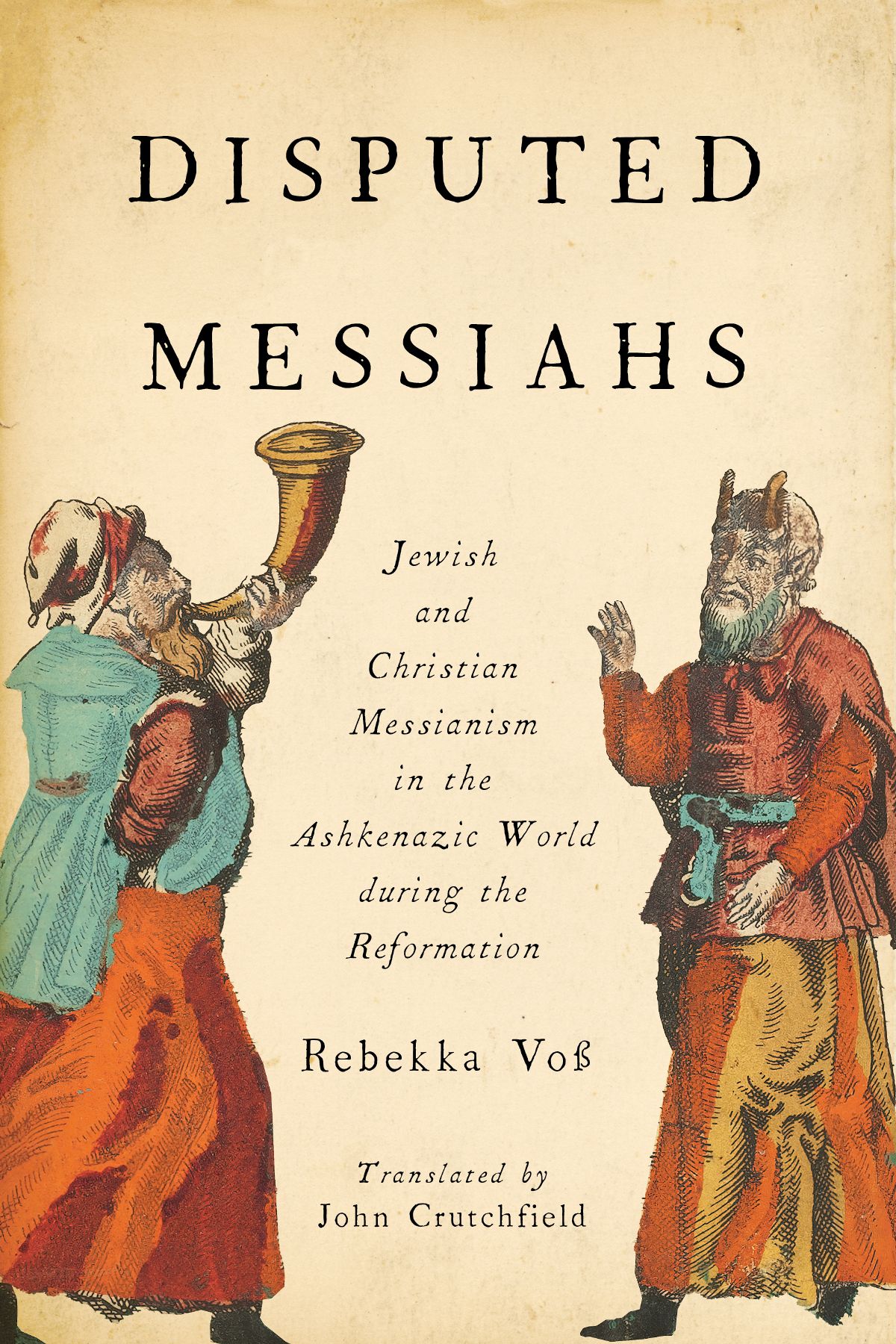
Rebekka Vo
Translated by John Crutchfield

Wayne State University Press
Detroit
2021 by Wayne State University Press, Detroit, Michigan 48201. Originally published in German as Umstrittene Erlser. All rights reserved. No part of this book may be reproduced without formal permission. Manufactured in the United States of America.
ISBN 978-0-8143-4861-1 (paperback)
ISBN 978-0-8143-4164-3 (hardcover)
ISBN 978-0-8143-4165-0 (e-book)
Library of Congress Control Number: 2021938616
On cover: The Jews Entrance with Their Messiah, undated colored reproduction from Dietrich Schwab, Jdischer Deckmantel (Mainz, 1619). Historical Museum, Frankfurt am Main, C 10154. Cover design by Michel Vrana.
Wayne State University Press rests on Waawiyaataanong, also referred to as Detroit, the ancestral and contemporary homeland of the Three Fires Confederacy. These sovereign lands were granted by the Ojibwe, Odawa, Potawatomi, and Wyandot Nations, in 1807, through the Treaty of Detroit. Wayne State University Press affirms Indigenous sovereignty and honors all tribes with a connection to Detroit. With our Native neighbors, the press works to advance educational equity and promote a better future for the earth and all people.
Wayne State University Press
Leonard N. Simons Building
4809 Woodward Avenue
Detroit, Michigan 48201-1309
Visit us online at wsupress.wayne.edu.
References to internet websites (URLs) were accurate at the time of writing. Neither the author nor Wayne State University Press is responsible for URLs that may have expired or changed since the manuscript was prepared.
To my parents and grandparents
The idea for this book originated a long time ago, during an academic residency when I was a graduate student at Columbia University in the Fulbright Foreign Student Program. It was in the context of a two-semester lecture course taught by Yosef Hayim Yerushalmi, of blessed memory, entitled Messianic Movements and Ideas in Jewish History, that I began to explore this fascinating topic. As we examined the sixteenth century and the messianic revival following the expulsion of the Jews from the Iberian Peninsula (149297), we learned about Isaac Abravanel and Abraham ha-Levi, about David Reuveni and Solomon Molkho; but within this illustrious circle of messianic protagonists and their followers, German Jews were hardly represented at all. I decided to investigate this surprising gap.
The study of Ashkenazic messianism during the Reformation became my dissertation project and eventually resulted in the publication of a book in German with the publisher Vandenhoek & Ruprecht in the series Jdische Religion, Geschichte und Kultur in 2011. I am excited that a revised and updated English edition now makes my research available to a broader audience. In the ten years that have elapsed since the first edition, scholarship on Jewish messianism in the Ashkenazic world during the sixteenth century has remained as scarce as it was at the inception of my project. Besides the updated bibliography, this English translation in particular features a revised introduction that sharpens my original argument of how to rethink messianic expectation among Ashkenazic Jews in Central Europe, northern Italy, and Poland-Lithuania.
Unfortunately, Yerushalmi was unable to witness the books original publication; nevertheless, the first thanks go to himfor leading me to this theme, for the careful exploratory conversations we had, and above all for his confidence in my scholarly aptitude. In the end, I did not do my doctoral work at Columbia but rather at Heinrich Heine University in Dsseldorf (Germany) under the supervision of Stefan Rohrbacher. I would like to express my heartfelt thanks to him as well as to Marion Aptroot, who took on the role of second reader, for their invaluable support. I am especially indebted to Elisheva Carlebach, now at Columbia University, who from the very beginning supported me with her expertise. Her groundbreaking study, Die messianische Haltung der deutschen Juden (2001), closes with the expectation that a fresh consideration of these source materials will produce a new profile of the Ashkenazic messianic attitude. I have endeavored to begin where she left off; and I thank her for this indispensable foundation and for her critical acumen. The English edition would not have come to fruition without the encouragement of Matt Goldish, who suggested I turn to Wayne State University Press. I wish to thank the anonymous readers for the press for their insightful comments that have further strengthened my manuscript.
For stimulating discussions on various aspects of the project, I would also like to thank Jeremy Dauber, Yaacov Deutsch, Micha Perry, Lucia Raspe, Ursula Reuter, David Ruderman, Anselm Schubert, Wolfgang Treue, and Israel Yuval. For many other useful references and suggestions, thanks go to (among others) Moti Benmelech, Dagmar Brner-Klein, Stephen Burnett, Abraham David, Jonah Fraenkel, Yacov Guggenheim, Elisabeth Hollender, Iris Idelson-Shein, Maoz Kahana, Birgit Klein, Stefan Lang, Tamar Lewinsky, Gianfranco Miletto, Rotraud Ries, Elisheva Schnfeld, Renata Segre, Bernard Septimus, Erika Timm, and Sara Zfatman, as well as to the participants in conferences, symposia, and seminars where I have presented my theses. Furthermore, I would like to thank the staff at the libraries and archives where I have conducted my research.
Various scholarships and stipends made it possible for me to focus for several years exclusively on doing research for my dissertation and on consulting source materials in Israel, the United States, and Europe. Without the financial support of the Studienstiftung des deutschen Volkes, the Gerda Henkel Foundation, and the Rothschild Foundation Europe, this book could not have been written. A Harry Starr Fellowship in Judaica at Harvard University in 20089 provided me the necessary time, in scenic Cambridge, to begin to rework the dissertation into a book. Finally, the present translation into English has been made possible by an ARCHES award from the Federal German Ministry for Education and Research (BMBF), administered by the Minerva Foundation.
It was a pleasure to work with John Crutchfield, who completed the translation from German into English. The books production was capably supervised initially by Kathy Wildfong and then by Annie Martin and their team at Wayne State University Press. I wish to thank my student assistants Mellanie Plewa and Alena Rabenau for their help in the technical preparation of the manuscript. Any remaining errors or inaccuracies in the book are, of course, my own. Throughout this project from dissertation to translated English book, many others, above all my husband, Robert, and my parents, as well as other family, friends, and colleagues, who cannot all be named here, supported me in different waysand distracted me from it, which was at least as important for shaping this book into what it is.
Frankfurt am Main
January 2021
The transcription of Hebrew and Yiddish follows the general principles laid out in the Encyclopaedia Judaica, vol. 1 (2nd ed., 2007), 19798. Technical terms and proper names in Hebrew are generally simplified and rendered in the current English form, while Israeli authors are given in the forms in parallel titles or in foreign language publications. Whenever possible, Hebrew and Yiddish titles are given according to their parallel titles, otherwise in transcription as outlined above.
Next pageFont size:
Interval:
Bookmark:
Similar books «Disputed Messiahs: Jewish and Christian Messianism in the Ashkenazic World during the Reformation»
Look at similar books to Disputed Messiahs: Jewish and Christian Messianism in the Ashkenazic World during the Reformation. We have selected literature similar in name and meaning in the hope of providing readers with more options to find new, interesting, not yet read works.
Discussion, reviews of the book Disputed Messiahs: Jewish and Christian Messianism in the Ashkenazic World during the Reformation and just readers' own opinions. Leave your comments, write what you think about the work, its meaning or the main characters. Specify what exactly you liked and what you didn't like, and why you think so.

